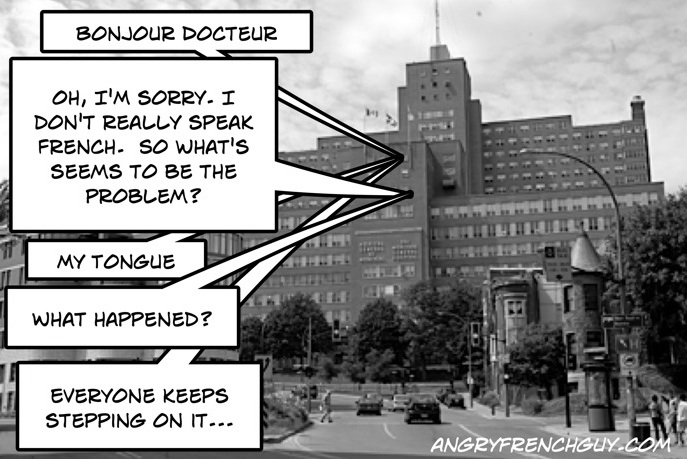McGill français

The first thing our professor told us on the first day of our first semester in the political science program at Laval University in Québec City is that we had to be able to read English at a very high level. « If your English is not good enough, leave right now. Go take English classes or go spend the year in BC and come back next year. »
Laval is a French language university in Québec City, which is 95% French-speaking. It’s the university of Lucien Bouchard. But English is the language of scholarly research, explained the professor. You had to be able to read and write in English, whether you were a separatist or a federalist, a communist or a neo-conservative.
English was a basic tool you needed to be able to work with in order to become a political scientist, the same way that an engineer needs math. The school functioned in French, our lectures were in French and we wrote our assignments in French, but being able to read many relatively arcane monographs and articles in English was a necessary skill required to do our job as a student and in the world beyond campus.
So my question is: if it is reasonable to expect political science students to understand English, why is it not required that nurses and doctors trained by McGill and the MUHC speak French?
What could be a more basic skill required of a doctor or nurse that she be able to understand easily and with great accuracy the language of her patients?
In Montreal and Québec the vast majority of people still speak French, as far as I know. Montreal’s so-called English-language hospitals like the Montreal General, the Royal Victoria and the Jewish are required by law to be able to provide French-language services to anybody who asks for it.
So how can an advanced knowledge of the French language not be an admission or graduation requirement?
McGill does not require language testing of it’s students either before admission or graduation. As a result about 50% of McGill trained doctors leave Québec every year!
The medical sector is not, by any means, the only one affected by this total failure of Quebec’s English higher education institutions to properly train students for the Québec job market. According to a recent study, 61% of English-speaking bachelors, 66% of English-speaking masters and 73% of English-speaking PhDs leave Québec.
The vast majority of Anglo-Québécois are self-declared bilinguals, that is absolutely true. But how comfortable is someone who has only ever studied in English, from kindergarten through university, in actually working, reading, and writing in French on a daily basis?
We don’t know the answer to that question because studies and census data on bilingualism in Québec and Canada usually rely on self-assessments. Actual second-language ability of students has not been tested at any point during their student career.
Because the vast mass of technical and scholarly literature is published in English, graduates from French language universities are actually much better prepared to work in a multilingual environment than graduates from McGill and Concordia!
McGill’s law school makes it mandatory for students to be fluent in French because to practice a legal profession in Québec’s legal system you not only need to be able to understand French, but actually work in the language.
And they would have us believe that health care professionals don’t?